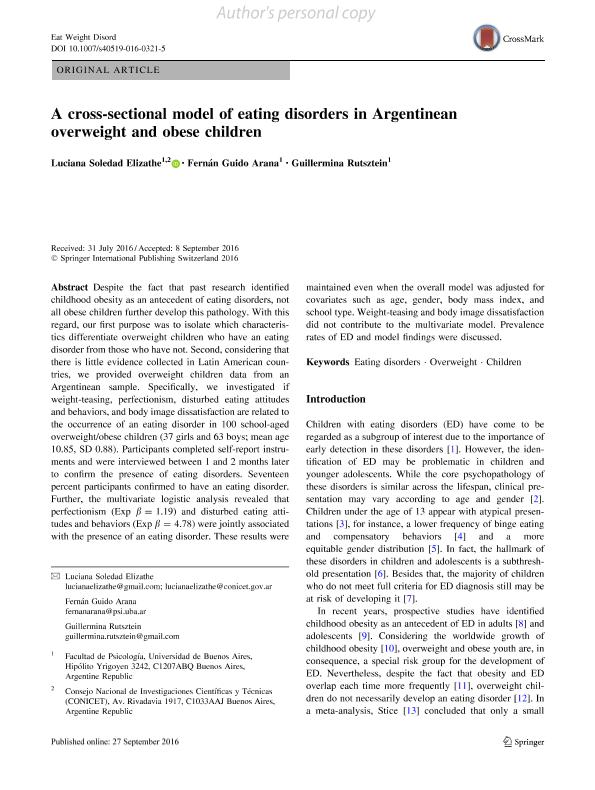Artículo
A cross-sectional model of eating disorders in Argentinean overweight and obese children
Fecha de publicación:
09/2016
Editorial:
Springer
Revista:
Eating And Weight Disorders-studies On Anorexia Bulimia And Obesity
ISSN:
1124-4909
Idioma:
Inglés
Tipo de recurso:
Artículo publicado
Clasificación temática:
Resumen
Despite the fact that past research identified childhood obesity as an antecedent of eating disorders, not all obese children further develop this pathology. With this regard, our first purpose was to isolate which characteristics differentiate overweight children who have an eating disorder from those who have not. Second, considering that there is little evidence collected in Latin American countries, we provided overweight children data from an Argentinean sample. Specifically, we investigated if weight-teasing, perfectionism, disturbed eating attitudes and behaviors, and body image dissatisfaction, are related to the occurrence of an eating disorder in 100 school-aged overweight/obese children (37 girls and 63 boys; mean age = 10.85, SD = 0.88). Participants completed self-report instruments and were interviewed between one and two months later to confirm the presence of eating disorders. Seventeen percent participants confirmed to have an eating disorder. Further, the multivariate logistic analysis revealed that perfectionism (Exp β = 1.19) and disturbed eating attitudes and behaviors (Exp β = 4.78) were jointly associated to the presence of an eating disorder. These results were maintained even when the overall model was adjusted for covariates such as age, gender, body mass index, and school type. Weight-teasing and body image dissatisfaction did not contribute to the multivariate model. Prevalence rates of ED and model findings were discussed.
Palabras clave:
Eating-Disorders
,
Overweight
,
Children
,
Perfectionism
Archivos asociados
Licencia
Identificadores
Colecciones
Articulos(SEDE CENTRAL)
Articulos de SEDE CENTRAL
Articulos de SEDE CENTRAL
Citación
Elizathe, Luciana Soledad; Arana, Fernán Guido; Rutsztein, Guillermina; A cross-sectional model of eating disorders in Argentinean overweight and obese children; Springer; Eating And Weight Disorders-studies On Anorexia Bulimia And Obesity; 23; 1; 9-2016; 125–132
Compartir
Altmétricas




